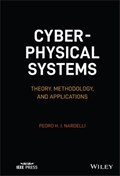CYBER-PHYSICAL SYSTEMS
Provides a unique general theory of cyber-physical systems, focusing on how physical, data, and decision processes are articulated as a complex whole
Cyber-physical systems (CPS) operate in complex environments systems with integrated physical and computational capabilities. With the ability to interact with humans through variety of modalities, cyber-physical systems are applied across areas such as Internet of Things (IoT)-enabled devices, smart grids, autonomous automotive systems, medical monitoring, and distributed robotics. Existing engineering methods are capable of solving technical problems, yet the deployment of CPS in a net-enabled society requires a general theory of cyber-physical systems that goes beyond specific study cases and their associated technological development.
Cyber-physical Systems: Theory, Methodology, and Applications is a unique theoretical-methodological guide to assessing systems where complex information processing defines the behavior of physical processes. Using a systematic approach, the book describes the fundamentals of cybernetics, complexity sciences, system engineering, concepts of data and information, the data dissemination process, graph theory, and more. Readers are provided with the general theory, methodological framework, and analytical tools to assess and design CPS for applications in transport, energy, communication, health care, the military, and industry.
Cyber-physical Systems: Theory, Methodology, and Applications is a must-read for undergraduate and graduate students, researchers, and practitioners in electrical and computer engineering and other technical fields.

